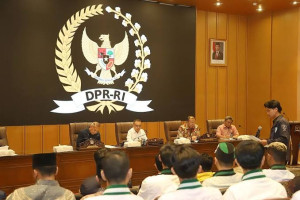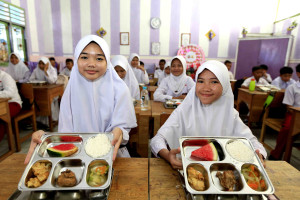Renewable energy draft bill stuck in the pipeline as House cannot conclude discussions on power wheeling
The House of Representatives (DPR) and the government have yet to successfully pass the Draft Bill on New and Renewable Energy (RUU EBT) after approximately a year of discussions.
At least two deadlines for completion, namely before the G20-Bali Summit and a new deadline in June 2023, have both been missed. The contestation over interests surrounding the power wheeling issue is cited as the main reason for the delay in discussing the bill.
The passing of the bill is eagerly awaited by stakeholders, especially investors in the renewable energy sector. This is due to Indonesia's position as the owner of abundant renewable energy resources such as hydro, solar, wind, biomass, geothermal, tidal, and nuclear energy.
Furthermore, the delayed completion of the RUU EBT into law could also jeopardize Indonesia's commitment to achieve net-zero emissions by 2060.
Disagreement over power wheeling provision
Power wheeling is a mechanism that allows private companies or independent power producers (IPPs) to build power plants and sell the electricity generated to households and industries. Under the current regulations, electricity produced by private power plants can only be sold to PT Perusahaan Listrik Negara (Persero) at a price regulated by the government.
"If the draft bill (EBT) earlier had already been discussed 90%, it's just a matter of power wheeling. Ideally, the power wheeling provision should be removed by the Ministry of Energy and Mineral Resources. If it's removes, everything should be resolved. However, it seems that the party who proposed the power wheeling provision has considerable influence," said Fahmy Radhi, an energy economist from Gadjah Mada University (UGM) on Wednesday (05/07/2023).
According to Fahmy, the delayed completion of the RUU EBT discussions started with the inclusion of power wheeling in the government's problem inventory list (Daftar Inventarisasi Masalah - DIM) related to the bill in late November of last year.
"Unexpectedly - it actually came from the government - the DIM included input regarding power wheeling. This caused a division within the DPR. If I'm not mistaken, even within the government, Sri Mulyani [Finance Minister] also disagreed with power wheeling," he revealed.
Finance Minister rejects power wheeling
The proposal for power wheeling was rejected by the Finance Minister due to the potential impact on PLN consumers, which could result in compensation that needs to be paid by the state budget to the state-owned power company.
"It was at that stage that the discussion on the RUU EBT was hindered. However, it is crucial. This is a serious obstacle, and I suspect it was a request from entrepreneurs who want more liberalization in the electricity sector," he explained.
Similar sentiments were expressed by Komaidi Notonegoro, the Executive Director of the ReforMiner Institute. According to him, the lack of agreement on power wheeling has led to the prolonged delay in reaching a resolution.
"According to information from Commission VII of the DPR, there were reportedly objections from colleagues at PLN. With the presence of power wheeling, PLN will inevitably be relatively disadvantaged. Especially considering that PLN is currently facing oversupply," he said.
Tag
Already have an account? Sign In
-
Start reading
Freemium
-
Monthly Subscription
20% OFF$29.75
$37.19/MonthCancel anytime
This offer is open to all new subscribers!
Subscribe now -
Yearly Subscription
33% OFF$228.13
$340.5/YearCancel anytime
This offer is open to all new subscribers!
Subscribe now







